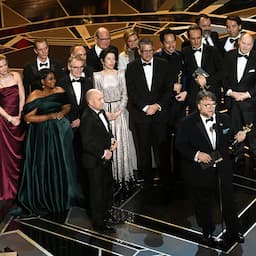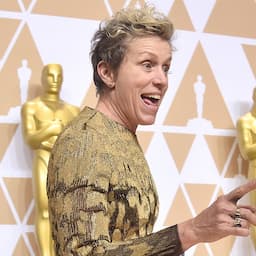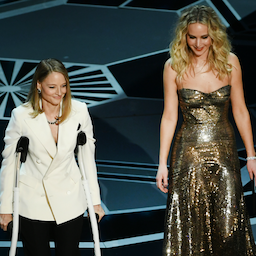The 'Three Billboards Outside Ebbing, Missouri' star issued a pointed call to action during her powerful acceptance speech on Sunday.
Frances McDormand didn't mince words when she accepted her Oscar on Sunday night.
After asking every female nominee in every category to stand with her, she issued a clear call to action to the audience.
"And now I want to get some perspective. If I may be so honored to have all the female nominees in every category stand with me in this room tonight, the actors -- Meryl, if you do it, everybody else will, c'mon -- the filmmakers, the producers, the directors, the writers, the cinematographer, the composers, the songwriters, the designers. C'mon!" McDormand said. "OK, look around everybody. Look around, ladies and gentlemen, because we all have stories to tell and projects we need financed.
"Don't talk to us about it at the parties tonight. Invite us into your office in a couple days, or you can come to ours, whatever suits you best, and we'll tell you all about them," she added before concluding her speech with just two simple words: "Inclusion rider."
For those wondering what the industry term means, allow comedian Whitney Cummings to explain.
"An inclusion rider is something actors put into their contracts to ensure gender and racial equality in hiring on movie sets," she writes on Twitter. "We should support this for a billion reasons, but if you can't find a reason to, here's one: it will make movies better."
This applies to jobs both above and below the line, in front of the camera and behind.
Elizabeth Banks couldn't help enthusiastically tweeting her support of McDormand's speech, posting, "Fran McD for the f**king WIN #InclusionRider #TimesUp #Oscars."
Backstage, McDormand admitted that inclusion riders were a relatively new concept to her.
"I just found out about inclusion riders," she told journalists. "It has always been available to everyone who does a negotiation on a film. You can ask for and/or demand 50 percent diversity in cast and crew. I just learned that after 35 years in being in the film business. The whole idea of women 'trending?' No. African Americans 'trending?' No. It ends now."
In a 2014 essay for The Hollywood Reporter, USC Annenberg's Media, Diversity & Social Change Initiative director Stacy L. Smith addressed the concept of an "equity rider."
"What if A-list actors amended every contract with an equity rider? The clause would state that tertiary speaking characters should match the gender distribution of the setting for the film, as long as it's sensible for the plot," she wrote. "If notable actors working across 25 top films in 2013 had made this change to their contracts, the proportion of balanced films (about half-female) would have jumped from 16 percent to 41 percent. Imagine the possibilities if a few actors exercised their power contractually on behalf of women and girls. It wouldn't necessarily mean more lead roles for females, but it would create a diverse onscreen demography reflecting a population comprised of 50 percent women and girls."
Queer Eye for the Straight Guy's Karamo Brown recently opened up about his own riders, also known as contracts, in an interview with A&U.
"I make sure that in my contract they must hire two to three gay African Americans to be on crew," he said. "I’ve done that now on the past three shows that I’ve been on and that’s important for me."
Jessica Chastain also famously enlisted the tactic in solidarity with her The Help co-star, Octavia Spencer, while negotiating their salaries for an upcoming comedy film.
"She was like, 'It's time that women get paid the same as men!' And I'm like, 'Yeah, Jessica! It’s time!,'" Spencer shared during a Women Breaking Barriers panel at the 2018 Sundance Film Festival in Park City, Utah, earlier this year. "And we were dropping F-bombs and getting it all out there."
That's when the conversation switched over to pay for women of color.
"I told her my story and we talked numbers and [Jessica] was quiet, and she had no idea that that's what it was like for women of color," Spencer recalled. "She said, 'Octavia, we're gonna get you paid on this film. .... You and I are gonna be tied together. We're gonna be favored nations, and we're gonna make the same thing.'"
RELATED CONTENT:


